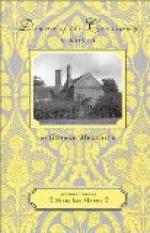The natural result of this habit of ascending to a superlunary home, was the loss of an exact sense of how she was behaving below. At the Berkshire mansion, she wore a supercilious air, almost as icy as she accused the place of being. Emma knew she must have seen in the library a row of her literary ventures, exquisitely bound; but there was no allusion to the books. Mary Paynham’s portrait of Mrs. Warwick hung staring over the fireplace, and was criticized, as though its occupancy of that position had no significance.
‘He thinks she has a streak of genius,’ Diana said to Emma.
‘It may be shown in time,’ Emma replied, for a comment on the work. ’He should know, for the Spanish pictures are noble acquisitions.’
‘They are, doubtless, good investments.’
He had been foolish enough to say, in Diana’s hearing, that he considered the purchase of the Berkshire estate a good investment. It had not yet a name. She suggested various titles for Emma to propose: ‘The Funds’; or ‘Capital Towers’; or ‘Dividend Manor’; or ‘Railholm’; blind to the evidence of inflicting pain. Emma, from what she had guess concerning the purchaser of The Crossways, apprehended a discovery there which might make Tony’s treatment of him unkinder, seeing that she appeared actuated contrariously; and only her invalid’s new happiness in the small excursions she was capable of taking to a definite spot, of some homely attractiveness, moved her to follow her own proposal for the journey. Diana pleaded urgently, childishly in tone, to have Arthur Rhodes with them, ’so as to be sure of a sympathetic companion for a walk on the Downs.’ At The Crossways, they were soon aware that Mr. Redworth’s domestics were in attendance to serve them. Manifestly the house was his property, and not much of an investment! The principal bed-room, her father’s once, and her own, devoted now to Emma’s use, appalled her with a resemblance to her London room. She had noticed some of her furniture at ‘Dividend Manor,’ and chosen to consider it in the light of a bargain from a purchase at the sale of her goods. Here was her bed, her writing-table, her chair of authorship, desks, books, ornaments, water-colour sketches. And the drawing-room was fitted with her brackets and etageres, holding every knickknack she had possessed and scattered, small bronzes, antiques, ivory junks, quaint ivory figures Chinese and Japanese, bits of porcelain, silver incense-urns, dozens of dainty sundries. She had a shamed curiosity to spy for an omission of one of them; all were there. The Crossways had been turned into a trap.
Her reply to this blunt wooing, conspired, she felt justifled in thinking, between him and Emma, was emphatic in muteness. She treated it as if unobserved. At night, in bed, the scene of his mission from Emma to her under this roof, barred her customary ascent to her planetary kingdom. Next day she took Arthur after breakfast for a walk on the Downs and remained absent till ten minutes before the hour of dinner. As to that young gentleman, he was near to being caressed in public. Arthur’s opinions, his good sayings, were quoted; his excellent companionship on really poetical walks, and perfect sympathy, praised to his face. Challenged by her initiative to a kind of language that threw Redworth out, he declaimed: ’We pace with some who make young morning stale.’




